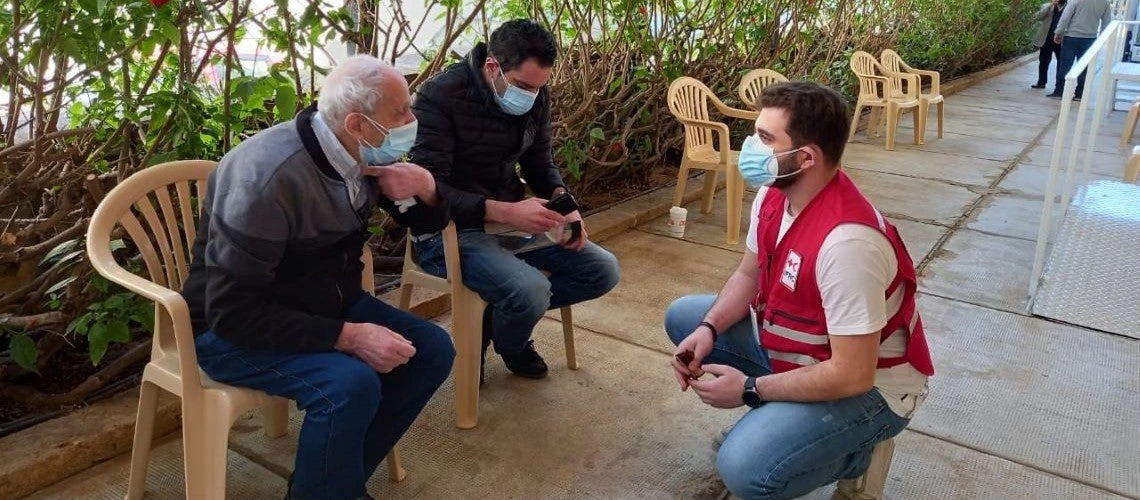 The International Federation of Red Cross and Red Crescents Societies (IFRC) was selected as the Third Party Monitoring Agents, an independent verification and monitoring mechanisms.
The International Federation of Red Cross and Red Crescents Societies (IFRC) was selected as the Third Party Monitoring Agents, an independent verification and monitoring mechanisms.
Lebanon is currently facing a wave of crises, unprecedented in magnitude, with devastating socio-economic effects, all further exacerbated by the COVID-19 pandemic.
Lebanon’s weak governance has led to increased risks of corruption and elite capture of state institutions, limiting the effective use of public resources. The lack of effective governance perpetuates a system characterized by weak public financial management and public procurement. Public oversight institutions have capacity constraints: internal control and audit functions are very limited in the public sector, increasing the risk of misuse and mismanagement of public funds. This is accentuated by the absence of an independent procurement complaints handling mechanism and a public procurement regulatory body, both of which are essential for transparent and accountable spending of public funds. This has naturally led to very low citizen trust in public institutions: Lebanon is ranked 149 in the Transparency International Corruption Index 2020.
In this context, robust and transparent accountability mechanisms and independent verification systems are necessary to ensure compliance with the World Bank’s policies and procedures under Bank financed projects in Lebanon. These mechanisms are also critical to ensure citizen confidence in Bank financed operations, particularly with the increased emphasis on emergency operations to save lives and livelihoods. But additional transparency measures come at a cost. Such resources are not readily available in a country where scarce financing is prioritized to reach a maximum number of target beneficiaries.
World Bank teams in Lebanon have introduced independent verification and monitoring mechanisms into Bank financed operations, and have required, as part of the legally binding financing agreements, the hiring of Third Party Monitoring Agents (TPMA) to independently verify the delivery of project activities to intended beneficiaries and purposes.
In January 2021, the World Bank approved its first COVID-19 vaccine support operation via the reallocation of US$34 million under the Lebanon Health Resilient Project. In order to ensure compliance with its fiduciary and safeguard policies and with Lebanon’s National COVID-19 Deployment and Vaccination Plan, the World Bank contracted a third party monitoring agent to independently monitor the vaccine rollout and ensure safe handling of the vaccines, as well as fair, fast and broad access to all.
The TPMA Terms of Reference were formulated through close coordination between fiduciary, health, country management and corporate teams who mobilized in just a few days, demonstrating an outstanding cross-unit commitment. The International Federation of Red Cross and Red Crescents Societies (IFRC) was selected as the TPMA and the related contract was signed in 24 hours based on corporate procurement guidelines.
IFRC’s monitoring covers the COVID-19 vaccine supply chain management as well as vaccine administration at vaccination sites and mobile clinics. IFRC reports are publicly disclosed and detailed information collected by field monitors helps continuously improve the efficient implementation of the vaccination drive.
Independent verification and monitoring mechanisms have also been introduced in other projects with increased engagement of UN Agencies using streamlined approaches through standard agreements. Responding to increased demand for transparency and accountability, TPMA are also envisaged to be hired in cash transfer programs to verify the eligibility of beneficiaries and obtain assurance that payments made by contracted UN agencies are actually reaching intended beneficiaries. TPMA reports would also be disclosed publicly.
The scope of any TPMA contract and its approach can be customized based on its objective to support the World Bank in meeting its fiduciary compliance requirements. In parallel, World Bank project teams exercise close supervision of project implementation, including review of the TPMAs reports and monitoring the TPMA’s performance. In a fragile context, the introduction of innovative out-of-the box verification mechanisms to respond to rising risks of corruption and misuse of funds has become a necessity. Independent verification coupled with other monitoring mechanisms including field visits, geo-tagging, citizen engagement tools, hands on extended implementation support (HEIS) etc. are designed to contribute to the ultimate World Bank’s fiduciary assurance objective of ensuring “the funds are used for the intended purpose”.



Join the Conversation